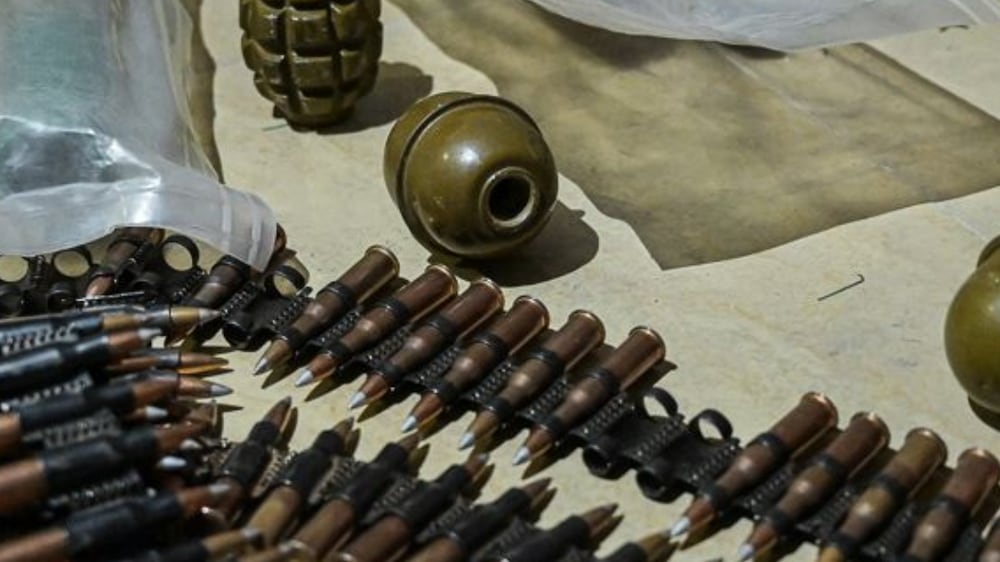The business of firearms dealer Abdullah has been booming since Lebanon's economy collapsed.
He sells at least three rifles a day – Kalashnikovs are popular among households in fear for their safety as crime rates soar. He also sells boxes of ammunition and grenades.
An automatic rifle or machinegun costs between $400 and $1,400.
His sales have risen threefold since the financial crisis began in 2019, even though the dollar value of the minimum wage has dropped to just $25 per month.
People have been rushing to buy weapons on the black market in the past year as the struggling state fails to prevent rising crime and political violence.
'There is no state'
Abdullah makes $2,000 per month selling arms. “That's more than a doctor’s salary nowadays,” he says, taking a puff from his cigarette as he hunches over a pile of grenades on the floor of an abandoned house.
The gaunt 30-year-old is a member of an arms smuggling ring with connections in Syria. He says 90 per cent of his clients are ordinary people from Beirut. He also sells weapons to smaller dealers in the capital.
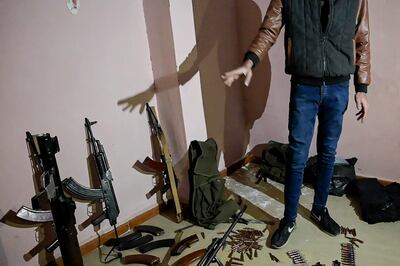
The state, which provided a semblance of protection before the crisis, is withering away in the eyes of many Lebanese, and sectarian clashes are more common.
Banks have frozen savings and restricted withdrawals. Residents began keeping their money and valuables at home.
“There is no state in Lebanon. My clients just want to protect their houses, their families, their money,” Abdullah says.
The Russian-made Kalashnikov is a national favourite, he says, and rocket-propelled grenade launchers, RPGs, are also in high demand.
Handguns command high prices. An Austrian Glock 17 Gen5, which sells for $500 in the US – could fetch up to $5,000 on the Lebanese black market.
Abdullah is wanted by the authorities. He drives a car without a number plate around the quiet streets of Hermel, a town in the north-east Bekaa Valley. The mostly Shiite area largely controlled by clans and the Iran-backed Hezbollah movement.
The Bekaa Valley is known for illegal activities including smuggling, car theft and drug production.
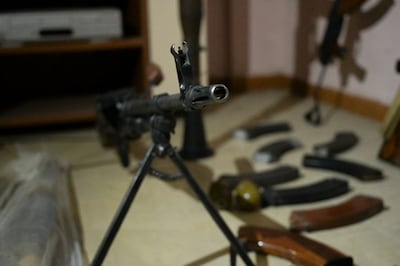
It is not just the economic crisis that has sent Abdullah's sales skyrocketing; recent political instability led to a rush for weapons, he tells The National.
In October, Hezbollah supporters fought gun battles with unknown rivals on the streets of Beirut, leaving seven people dead.
Abdullah says many Lebanese fear the violence means a return to civil war, so they stocked up on arms and ammunition.
“The whole Hermel region was out of stock after the clashes. I sent more than 300 boxes of ammunition to Beirut in one day.”
Each box contains between 700 and 1,000 rounds.
Weapons for whisky
Abdullah says that before economic collapse, which pushed more than 80 per cent of the population into poverty, it would take months to sell his stock. Now, his shipments from Syria sell out in weeks.
He brings more than 150 “items” at a time every few weeks, at least 70 of which will be guns, ammunition and grenades.
There has always been smuggling along Lebanon's border with Syria, but a decade of war and economic crises on both sides have made illegal trade easier.
Smugglers typically use back routes and smaller roads to get from Syria into Lebanon and then from the border to Beirut, avoiding checkpoints and the army.
Abdullah boasts about bribing officials to let his merchandise through checkpoints, a practice traffickers call “buying the road”.
“I can buy the highest-ranking Syrian officer with a bottle of whisky or a $50 tip if I’m feeling very, very generous,” he says.
“The problem is that it’s easier to smuggle arms from Syria to Lebanon than to move them from Hermel to Beirut.”
Smugglers only “buy the road” in Lebanon when they need to take a large shipment that requires lorries, he says.
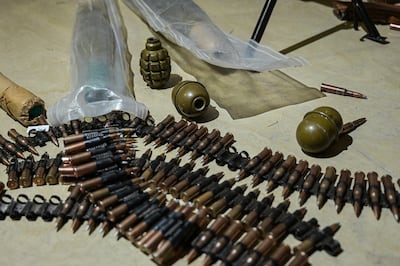
A representative of Lebanon’s Internal Security Forces says the proliferation of light weapons has been a problem since the start of the civil war in 1975. But he says authorities are still in control of the situation.
"In general, we have a hold on security. Criminals know that we will look for them," the representative says.
"The problem in Lebanon is not about loose security, it’s the political and economic situation."
He denies that so many Lebanese people were stocking up on arms now.
"I don’t think people can afford it any more," he says.
But that is not the case for people like Majed, a father of two. He says he never would have imagined that owning a gun would be a part of his life – even when his friend gave him a handgun as a gift in February.
“The market for guns is booming for people like me: regular folks with a little bit of money who want to keep their family safe,” Majed, 40, says from his home in the well-to-do Antelias suburb of Beirut.
Majed started going to the shooting range with his wife every week since he became a gun owner. Although he doesn’t store the weapon at home, he is thinking about doing so “for emergencies”.
"People are carrying guns for self-protection more – respectable and educated people you wouldn’t expect to be carrying guns," he says.
Crime rates have soared since the start of the crisis.
The ISF did not respond to a request for crime statistics. A report by the Beirut-based consultancy Information International showed a 212 per cent increase in car thefts, 265 per cent increase in robbery and a 101 per cent increase in homicide in the first 10 months of 2021.
What is left of Lebanon’s shrinking middle class is driving the demand for arms, says Edwin Haddad, who launched a holster company, Doubletap Concealment, in April.
“I was afraid it would fail, but sales have exceeded all my expectations,” he says.
He has more 60 clients every month for shooting paraphernalia and instruction.
“Most of them are not training because they are passionate about firearms, but because they are concerned for their safety,” he says.
'A man's pride is his rifle'
Malek Abi Nader, an expert on arms laws, says ordinary citizens can own only licensed hunting weapons in Lebanon; anything else is illegal. Security forces personnel may carry weapons on duty, and municipal police can carry firearms after getting a licence from the Ministry of Interior.
Yet, in 2018 Lebanon ranked second in the Middle East for civilian gun ownership per capita, according to the Graduate Institute of International and Development Studies in Geneva.
“It’s an old Lebanese tradition,” Mr Abi Nader says of owning weapons.
In his home town of Bsharre, a Christian town in north Lebanon, he believes there is a gun in every house.
“A rifle is considered a man’s pride, but the trend is new among city folks.”
While many ordinary gun buyers get unlicensed weapons from the likes of Abdullah, Lebanon’s VIPs who need protection can get weapon licences for their bodyguards from the Ministry of Defence, Mr Abi Nader says.
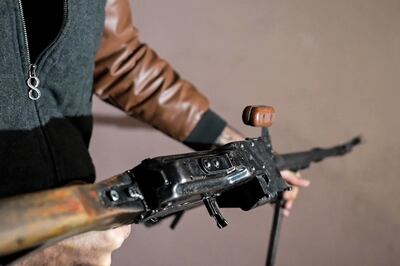
Many MPs, senior officials, businessmen and others have personal protection in a country where political assassinations and kidnappings were common during the civil war and after.
Although most armed groups laid down their weapons after war ended in 1990, Hezbollah did not. Today, it is by far the most well-armed and supplied non-military force in the region.
Dozens of smaller paramilitary groups as well as Palestinian factions also carry weapons.
Mr Abi Nader says MPs and ministers can buy firearms from security forces for personal protection and those are registered in their records. They are prohibited from selling or giving them as gifts.
But VIP firearms licences are only for the transfer of weapons and do not include the number or the type of weapon, which makes it difficult to track arms in circulation.
Mr Abi Nader says most people with a weapons licence are politically connected.
“Can you really blame people? This country has gone through tumultuous times, this is why people feel they need weapons," he says.
